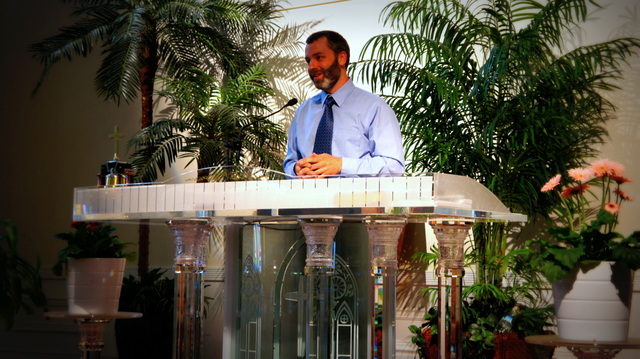I once heard someone say that preaching is sometimes like a university lecture, where the information passes from the notes of the professor to the notes of the student without passing through the brain of either.
Unfortunately there are a lot of misconceptions about what preaching really is and about how you should do it. Sometimes it’s helpful to identify those misconceptions to determine what preaching is not and then you can go from there.

Probably the most elaborate pulpit I’ve ever preached from.
Here are a few common misconceptions that I’ve come across over the years.
Preaching is not:
-
A running commentary (it’s necessary but there is much more).
-
A theological dissertation (theology is important but only effective when we make it clear and applicable to the people).
-
A time to prove your point on minor theological issues (We need to keep our own little theological quirks to ourselves while preaching. If it is not important it doesn’t belong in the pulpit).
-
A time to complain about everyone else’s faults in the church and outside of the church.
-
A mystical/spiritual process that needs no preparation.
-
A political speech.
-
A passionate tirade about anything and everything (Let you passion be informed, biblical, prepared and logical).
-
A time to impress people with your ability to speak, tell stories or come up with unique interpretations (This is often a temptation, however, our goal should bes for people to see beyond us to Christ).
-
A step by step “self help” or “recovery system”.
-
A time to make people feel “good” or “bad” about themselves.
Preaching may include many of the elements I just mention above but when any of those factors becomes the driving force then you can know that it has drifted off course.
What is preaching then?
Here is my definition:
Personal communication of God’s Word that explains and applies truth to man’s life.
If you want a more detailed definition try Haddon W. Robinson’s definition of expository preaching.
Expository preaching
– the communication of a biblical concept, derived from and transmitted through
a historical,
grammatical,
literary study of a passage in its context,
which the Holy Spirit first applies
to the personality and experience of the preacher, then through him to his hearers.
By the way, Robinson’s book Biblical Preaching: The Development and Delivery of Expository Messages is hands down the most useful book I’ve found on the art of preaching. If you have a chance, you should read it.
Question: What other misconceptions about preaching have you come across?












Luke Rumley
January 10, 20131) Pre-game pep talk?
2) This week’s current film review
3) Story-time (though these add in a big way when told well and when relevant, not distracting)
*Disclaimer: These have nothing to do with my church or pastor. Just being in church my whole life.
For even more fun (if you can laugh at yourself): https://twitter.com/ChrchCurmudgeon
Caleb
January 10, 2013Luke you’re right about stories, they can be extremely helpful when done right. Jesus used a lot of stories in his teaching. However, if preaching is nothing but story time, then you have a problem. Stories need to serve a solid purpose and truly aid the listeners in their understanding and application of Biblical truth. I follow @ChrchCurmudgeon too!
Dan Black
January 11, 2013Great definition of preaching. I would add a motivational speech. Which the Word of God can bring motivation but that’s not the primary reason for a sermon.
Caleb
January 12, 2013Dan, you’re right about the motivational speech. You can take someone like Tony Robins who is a great motivational speaker, but it’s certianly not a sermon. The motivation from in a motiviational speach comes from the speaker. There’s also motivation in a good sermon but it comes form Scripture and the Holy Spirit, not just from the speaker’s charisma.